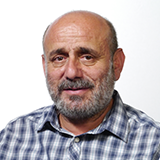
It’s clear from the process of the Armenian parliamentary election campaign that once again, as in previous elections, political parties are carrying out their campaigns mainly in the form of monologues. The few debates that some TV stations and press clubs organize probably are not awarded great significance against the backdrop of a “monologuing” campaign.
Especially since participating in these debates are not the top three candidates in the national electoral lists, or those who, not being included in the lists, nevertheless carry the burden of the entire campaign on their shoulders.
Outside of the news media, the campaign is mainly happening through gatherings organized in different residential areas with voters, where again the representatives of some political party or bloc monologue, hug and kiss, answer occasional questions, and promise paradise if they are elected.
And when someone at his gathering in another area suddenly points out the populist, unrealistic nature of a competing party’s promises, then at the next gathering or other occasion, that party’s representatives let loose thunder and lightning on those who doubt that their programs are realistic.
But the critic and the person being criticized can meet face to face and try to debate their ideas and their counterarguments, can they not?
Again, let me stress: I’m talking about a debate between the top figures of the parties’ and alliances’ national lists. Why am I emphasizing this? Because if, let me put it this way (and please, let no one be offended), the rank-and-file members of the national and regional lists gladly go to the debates organized by various press clubs or a few TV stations (well they also face the issue of becoming known and presenting themselves to the public), while the top figures mainly avoid such debates, preferring the monologue versions.
What am I suggesting? (By the way, I once made this suggestion during the presidential election, but after the Constitutional amendments, the parliamentary elections become more important.) It should be stated in the Electoral Code of the Republic of Armenia that during an election campaign period, debates between the top three candidates on parties’ and alliances’ national electoral lists shall be organized on Armenia’s public television, and that participating in these debates is MANDATORY for these top three figures.
That is to say, the top figures (the no. 1 on their lists) must debate with each other, and the second and third places, accordingly, with each other.
It can also be established that the schedule and the order of participants at each debate (I think no more than three people should participate in each debate) be determined by the Central Electoral Commission through a draw.
I’m sure that there will be at least two objections to this suggestion.
The first objection: “This would be interfering with the Public TV’s editorial independence.” I agree, but doesn’t this interference already exist? Through the Electoral Code, the Public TV of Armenia is obliged to provide unpaid and paid airtime to political parties and blocs running in the election.
Despite it being considered interfering, what I am suggesting will leave the choice of format and debate topics up to the Public TV, and viewers will be able to compare views directly.
The second objection: “You can’t compel candidates how to run their election campaigns.” And why not? Let one more thing be a requirement.
And why can you compel athletes, through soccer tournament regulations, to give press conferences before and after a game, but you can’t enforce debates during such an important political event? Let, for example, the no. 1 candidates in the national electoral lists come and debate with each other and prove the advantage of their ideas.
Otherwise, the defense minister, a candidate on one party’s list, monologues and counters the former defense minister who’s no. 1 on another list. Their face-to-face conversation would be more interesting and productive.
Mesrop Harutyunyan
The views expressed in the column are those of the author's and do not necessarily reflect the views of Media.am.


Add new comment
Comments by Media.am readers become public after moderation. We urge our readers not to leave anonymous comments. It’s always nice to know with whom one is speaking.
We do not publish comments that contain profanities, non-normative lexicon, personal attacks or threats. We do not publish comments that spread hate.